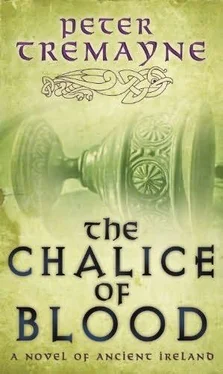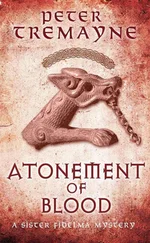Peter Tremayne - Chalice of Blood
Здесь есть возможность читать онлайн «Peter Tremayne - Chalice of Blood» весь текст электронной книги совершенно бесплатно (целиком полную версию без сокращений). В некоторых случаях можно слушать аудио, скачать через торрент в формате fb2 и присутствует краткое содержание. Жанр: Исторический детектив, на английском языке. Описание произведения, (предисловие) а так же отзывы посетителей доступны на портале библиотеки ЛибКат.
- Название:Chalice of Blood
- Автор:
- Жанр:
- Год:неизвестен
- ISBN:нет данных
- Рейтинг книги:5 / 5. Голосов: 1
-
Избранное:Добавить в избранное
- Отзывы:
-
Ваша оценка:
- 100
- 1
- 2
- 3
- 4
- 5
Chalice of Blood: краткое содержание, описание и аннотация
Предлагаем к чтению аннотацию, описание, краткое содержание или предисловие (зависит от того, что написал сам автор книги «Chalice of Blood»). Если вы не нашли необходимую информацию о книге — напишите в комментариях, мы постараемся отыскать её.
Chalice of Blood — читать онлайн бесплатно полную книгу (весь текст) целиком
Ниже представлен текст книги, разбитый по страницам. Система сохранения места последней прочитанной страницы, позволяет с удобством читать онлайн бесплатно книгу «Chalice of Blood», без необходимости каждый раз заново искать на чём Вы остановились. Поставьте закладку, и сможете в любой момент перейти на страницу, на которой закончили чтение.
Интервал:
Закладка:
‘Cathal has accepted the pallium offered by the people of Tarnetum. They call him Cataldus now,’ Brother Lugna replied. The sour tone in his voice made it clear that he did not approve.
‘I remember when Cathal was acting abbot. It was when I was sitting in judgement at the court here,’ Fidelma continued.
‘Ah yes. I was away at a Council at the abbey of Imleach at the time and appointed Cathal to take charge in my absence,’ replied the elderly abbot. ‘Brother Lugna, of course, was not with us then. He did not join us until three years ago.’
‘Three years? A short time to have risen to be rechtaire of the abbey,’ commented Eadulf softly.
‘Blessed are those who can recognise talent in others,’ Brother Lugna replied almost pugnaciously.
After a quick frown of disapproval at Eadulf, Fidelma turned her gaze to the abbot. ‘But you have been abbot here a long time, Iarnla,’ she said. ‘You must have known Cathal and Donnchad since they were young lads.’
‘I came here when our blessed founder, Carthach, whom we lovingly refer to by the pet name of Mo-Chuada, was still alive. He died in the very same year as your own father, King Failbe Flann. Sadly, you did not know either of them, Fidelma.’
A momentary melancholy crossed Fidelma’s features. ‘I was a babe in arms when my father died,’ she replied quietly. She had often expressed regret that she had never known her fatherand barely remembered her mother who had also died when she was young.
‘Your father and the Blessed Carthach were good friends. When the Uí Néill drove Carthach and his community out of Raithean, they fled south here to the Kingdom of Muman. Your father offered Carthach lands near Cashel to set up a new community but that holy man had a vision to come to this place, for he had passed through this country some years before. Did you know that Carthach actually healed your father of an ailment in his eye?’
Fidelma looked surprised. ‘I have not heard that story.’
‘Your father was distressed, for the King of Laighin was hard pressed by a revolt led by a distant relative, Crimthann mac Aedo Díbchíne, who had gathered support to challenge him for the kingship. King Failbe had concluded a treaty of friendship with King Fáelán, son of Colmán of Laighin. He promised that he would lead his warriors to assist him in times of crisis. Your father’s ailment caused him to be blind in one eye. To his anguish this meant he could not lead his warriors into battle. The Blessed Carthach treated him and cured the disease in his eye. Your father and his warriors joined Fáelán’s army, together with those of Conall, lord of Clann Cholmai, whose sister was married to Fáelán. They defeated Crimthann and his rebels at the Ford of the Smith, Áth Goain, on the River Lifé.’
Fidelma smiled sadly. ‘I knew of the victory of Áth Goain. It is a story told by the bards of my family. But I did not know of Carthach’s intercession with my father.’
‘It happened four years before your birth, the death of your father and the death of the Blessed Carthach all occurred in that one fateful year. It was just before those events that I heard that Mo-Chuada, the Blessed Carthach, had been offered this land by Maolochtair of the Déisi, and I came and joined him. Carthach was a great man, a great educator.’
‘But you say he died in the same year as my father. Is that when you became abbot?’
Abbot Iarnla chuckled with a shake of his head. ‘Bless you, child, I was still a young man. I could not have risen to such a height as abbot. Mo-Chuada’s maternal uncle, Cuanan, became abbot here. He died twenty years ago. That was when I took over.’
‘So there is little about the community here that you do not know,’ Fidelma said seriously.
‘I admit to the sin of pride in that,’ confirmed the abbot.
‘Then perhaps you can answer a question that has puzzled me. Is it usual in this community for a member to have a key to their cubiculum and to lock it?’
The abbot shook his head immediately. ‘It is not usual but there are exceptions.’
‘So Brother Donnchad was an exception? Why was that?’
There was some hesitation before Abbot Iarnla replied. He requested a key because he had returned from his pilgrimage to the Holy Land with some relics that he wished to keep safe.’
Fidelma’s brow furrowed as she considered his reply. ‘You mean that he was worried there might be thieves among your brethren?’
‘That is an insult to our community,’ intervened Brother Lugna, whose cheeks had coloured.
‘It is not I who am insulting them,’ Fidelma pointed out. ‘What other interpretation can be placed on why Brother Donnchad wanted a key to lock his cell?’
Brother Lugna’s mouth closed firmly. Abbot Iarnla was also silent for a moment while he seemed to consider the answer.
Fidelma looked from one to the other. Then she insisted softly, ‘How can I investigate this matter if I am not in possession of all the facts?’
Abbot Iarnla lowered his head. ‘Perhaps my steward should explain matters,’ he said in resignation. ‘He dealt with them.’
Brother Lugna hesitated. Fidelma faced him, waiting. Then he sighed. ‘It is true that, when Brother Donnchad came back, he returned with some things which he said he had picked up on his pilgrimage. He wanted them kept safe while he considered them.’
‘Considered them?’ queried Eadulf.
‘They were supposed to be mostly manuscripts rather than objects,’ explained the steward. ‘Like his brother, Cathal, Brother Donnchad was a scholar of many languages, of Greek and Hebrew as well as Latin, and also Aramaic. I never saw the documents, for he kept them hidden.’
‘The abbey here has a renowned scriptorium , a great library containing many such manuscripts,’ Fidelma pointed out. ‘Why did he not simply place the documents there? Surely the library is secure enough? What made these manuscripts so precious they had to be locked elsewhere?’
Brother Lugna raised his shoulders and let them drop in a resigned gesture. ‘As I say, I never saw them nor were they found in his cell after his death.’
Fidelma’s eyes narrowed for a moment and she looked at the abbot. ‘Did you see them, Abbot Iarnla?’
The abbot had not.
‘Anyway,’ the steward continued, ‘Brother Donnchad seemed so concerned, so anxious, that we decided to humour him and have a lock made for his door.’
‘Not simply a bolt on the inside?’
‘He was specific about a lock and key.’
‘Who made the lock and key?’
‘Our own smith, Brother Giolla-na-Naomh. He holds the rank of flaith-goba ,’ he added with a note of pride.
Fidelma knew that smiths had three distinctions of rankaccording to their qualifications, and the flaith-goba , or chief smith, had knowledge of all metalworking. The other two ranks were limited in both the metals they worked and the artefacts they could produce.
‘How many keys to this lock did he make?’
‘He was instructed to make only one and I presume that he made only one,’ replied the steward.
‘Presumption is not fact,’ observed Fidelma.
It was Abbot Iarnla who said: ‘When we could not gain entrance to Brother Donnchad’s cell, I summoned Brother Giolla-na-Naomh to help us. He had to break down the door. Had he made an extra key, he would have fetched it to save breaking the door.’
It was a good point but Fidelma was not entirely satisfied.
‘You say that you decided to humour Brother Donnchad in his demand for a key. “Humour” seems a curious word to use.’
Abbot Iarnla and Brother Lugna exchanged an uncomfortable glance.
‘Brother Donnchad was-’
Читать дальшеИнтервал:
Закладка:
Похожие книги на «Chalice of Blood»
Представляем Вашему вниманию похожие книги на «Chalice of Blood» списком для выбора. Мы отобрали схожую по названию и смыслу литературу в надежде предоставить читателям больше вариантов отыскать новые, интересные, ещё непрочитанные произведения.
Обсуждение, отзывы о книге «Chalice of Blood» и просто собственные мнения читателей. Оставьте ваши комментарии, напишите, что Вы думаете о произведении, его смысле или главных героях. Укажите что конкретно понравилось, а что нет, и почему Вы так считаете.











